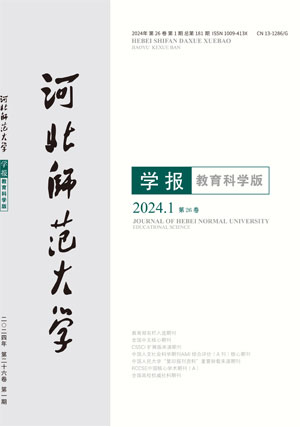期刊信息

- 刊名: 河北师范大学学报(教育科学版)Journal of Hebei Normal University (Educational Science Edition)
- 主办: 河北师范大学
- ISSN: 1009-413X
- CN: 13-1286/G
- 教育部名栏入选期刊
- 全国中文核心期刊
- CSSCI扩展版来源期刊
- AMI综合评价(A刊)核心期刊
- RCCSE中国核心学术期刊
- 全国高校特色栏目社科学报
- 中国人民大学“复印报刊资料”重要转载来源期刊
- 全国高校权威社科期刊
职业教育声誉治理:理论内涵、价值意蕴与机制构建
-
作者单位:(陕西师范大学 教育学部,陕西 西安 710062) -
起止页码:75 - 82页 -
DOI:10.13763/j.cnki.jhebnu.ese.2022.04.009
Reputation Governance of Vocational Education: Theoretical Connotation, Value Implication and Mechanism Construction
摘要/Abstract
当前,国家对职业教育的高度需求与重视和社会公众对职业教育的抵触与排斥存在矛盾冲突,其重要原因之一在于职业教育社会形象和声誉与其社会价值不相称。推进职业教育声誉治理是解决矛盾冲突、提升职业教育社会认同感、增强职业教育吸引力的重要一环。可塑性、信任和品牌是职业教育声誉治理的基础、关键和外在表征。声誉治理的微观价值是增加毕业生在劳动力市场中的竞争力,中观价值是激发和提高产教融合与校企合作的积极性和有效性,宏观价值是服务国家发展战略和打造中国特色职业教育国际品牌,底线价值是使职业教育获得不可复制的持续性竞争优势。在职业教育提质培优与高质量发展的背景下,应积极构建基于信任与激励、质量监督与评价、协同治理、“三”+“五”声誉治理的机制,助推职业教育增强软实力和竞争力、提升职业教育社会认同感和吸引力,从而重塑职业教育新的品牌形象。
At present, there is a contradiction between China's high demand for and attention to vocational education and the general public's resistance and rejection of vocational education. One of the reasons is that the social image and reputation of vocational education is not commensurate with its social value. Therefore, improving the governance of vocational education reputation is a crucial step to resolve conflicts, enhance social identity and attraction of vocational education. In vocational education reputation governance, plasticity, trust and brand are respectively the foundation, key and external representation. The micro value of reputation governance is to increase graduates' competitiveness in the labor market, the value in middle view is to stimulate the enthusiasm and improve the effectiveness of industry-education integration and school-enterprise cooperation, the macro value is to serve the national development strategy and build an international brand of vocational education with Chinese characteristics, and the bottom line value is to enable vocational education to obtain an irreplicable sustainable competitive advantage. In the context of quality improvement and value-added empowerment of vocational education, it's necessary to build a governance mechanism based on trust and incentives, quality supervision and evaluation, collaborative management, and achieve the “3 Visions” and “5 Integrations,” to increase its soft power and competitiveness, enhance its social identity and attraction, and reshape its brand image.
关键词
参考文献 27
- [ 1 ] 教育部等九部门关于印发《职业教育提质培优行动计划(2020—2023年)》的通知[EB/OL]. (2020-09-23)[2021-05-21]. http://www.moe.gov.cn/srcsite/a07/zcs_zhgg/202009/t20200929_492299.html.
- [ 2 ] 中共中央办公厅 国务院办公厅印发《关于推动现代职业教育高质量发展的意见》[EB/OL]. (2021-10-12)[2022-01-05]. http://www.gov.cn/zhengce/2021-10/12/content_5642120.htm.
- [ 3 ] 陈子季.推动现代职业教育高质量发展[J]. 教育家,2021(51):1.
- [ 4 ] 喻馨锐,王媛.“双高”背景下高职院校国际影响力的提升——基于“国际影响力50强”榜单的思考[J]. 教育与职业,2021(7):38-42.
- [ 5 ] 张培.共同体视域下职业教育治理的逻辑、框架与路径[J]. 教育与职业,2021(2):5-12.
- [ 6 ] 段婕.我国高等院校声誉管理的动态模型研究[J]. 高教探索,2014(1):36-39+68.
- [ 7 ] Berens G.,Van Riel C.B.M.. Corporate Associations in the Academic Literature:three Main Streams of Thought in the Reputation Measurement Literature[J]. Corporate Reputation Review,2004,7 (2):161-178.
- [ 8 ] Fombrun F., Shanley M.. What's in a name? Reputation Building and Corporate Strategy[J]. Academy of management journal, 1990, 33(2):233-258.
- [ 9 ] 郑超愚,孟祥慧.企业声誉、市场竞争与商业信用融资——基于中国上市公司的经验考察[J]. 东岳论丛,2021,42(1):98-106+191-192.
- [ 10 ] 酷卫华.声誉机制的公司治理作用研究[M]. 西安:西安交通大学出版社,2018.
- [ 11 ] Smircich L..Concepts of Culture and Organizational Analysis[J]. Administrative Science Quarterly,1983,28(3):339-358.
- [ 12 ] 周敏.声誉管理视角下的互联网治理研究[J]. 中国特色社会主义研究,2020(1):70-74.
- [ 13 ] 余津津.现代西方声誉理论述评[J]. 当代财经,2003(11):18-22.
- [ 14 ] 赵文华,江育恒.大学社会声誉的学理考察:国外研究进展及启示[J]. 外国教育研究,2020,47(4):102-115.
- [ 15 ] 周光礼.从同型竞争到错位竞争——高校品牌形成机制研究[J]. 中国高教研究,2017(10):4-12.
- [ 16 ] 刘晓玲,庄西真.注重基础、选择多元——职业教育人才培养质量评价的探索与实践[J]. 中国职业技术教育,2017(35):38-42.
- [ 17 ] 袁正.法律、声誉机制与市场交易治理[M]. 成都:西南财经大学出版社,2019.
- [ 18 ] 吴超鹏,金溪.社会资本、企业创新与会计绩效[J]. 会计研究,2020(4):45-57.
- [ 19 ] [美]凯文·杰克逊著.声誉管理[M]. 燕清联合,顾捷昕,张宏超,译.北京:新华出版社,2006.
- [ 20 ] 姜晓晖.公共部门的声誉治理探究——基于西方理论的概念谱系及典型国家的实践经验[J]. 国外社会科学,2019(3):69-78.
- [ 21 ] 储朝晖.深化教育评价改革的思考与建议[J]. 河北师范大学学报(教育科学版),2021,23(5):11-16.
- [ 22 ] 曹一红.基于责任观的第三方教育评估机构专业化建设[J]. 上海教育评估研究,2021,10(1):69-73.
- [ 23 ] 和芸琴.企业声誉内部管理——创建持续性竞争优势的新视角[M]. 北京:经济科学出版社,2012.
- [ 24 ] 中华人民共和国职业教育法[EB/OL]. (2022-04-20)[2022-05-13]. http://www.moe.gov.cn/jyb_sjzl/sjzl_zcfg/zcfg_jyfl/202204/t20220421_620064.html.
- [ 25 ] 树立正确“三观”开创外交新局面[EB/OL]. (2018-06-25)[2022-05-13]. http://pinglun.youth.cn/ttst/201806/t20180625_11651686.htm.
- [ 26 ] 王秋怡.习近平外交思想中的历史观、大局观、角色观[J]. 泽东邓小平理论研究,2020(9):36-41+108.
- [ 27 ] 为人人皆可成才尽展其才创造条件 努力推动技能型社会技能中国建设[EB/OL]. (2020-11-09)[2022-06-10]. http://www.moe.gov.cn/jyb_xwfb/gzdt_gzdt/moe_1485/202011/t20201109_498994.html.
